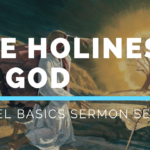Podcast: Play in new window | Download (Duration: 36:06 — 33.0MB) | Embed
Sermon Notes:
-
-
We must return to a God centered gospel
- Genesis begins with God and Revelation ends with God
- Throughout Scripture God is seen as saving for his “namesake”
-
- Psa 106:8 NIV – 8 Yet he saved them for his name’s sake, to make his mighty power known.
-
-
- From OT to NT we find that salvation is the story of God’s Power, God’s Grace, God’s plan, God’s Kingdom, God’s Son, God’s people, God’s holiness, God’s Greatness, God’s glory!
- It is only recently in Western culture that much of the church’s theology has shifted its emphasis in regards to the gospel to make it primarily about man.
- More specifically our individualistic, self-infatuated, me-motivated culture has permeated our thoughts about the gospel.
- Instead of being in awe of the holiness of God – we are in awe of hipster pastors
- Instead of seeking the glory of God – We’re more interested in the glamor of ministry
- Instead of the preaching the cross of Christ – we’ve settled for the couch of convenience
- Instead of trusting in the almighty power of God – we are told to believe in ourselves to find a power from within.
- A.W. Tozer tells us: “The low view of God entertained almost universally among Christians is the cause of a hundred lesser evils everywhere among us. A whole new philosophy of the Christian life has resulted from this one basic error in our religious thinking.”
- Later speaking of the vital importance of understanding the burden of our sin he says: “But unless the weight of the burden is felt the gospel can mean nothing to the man; and until he sees a vision of God high and lifted up, there will be no woe and no burden. Low views of God destroy the gospel for all who hold them.”
- Before we can even think of communicating a gospel that is about our God, for our God, and in praise of our God. We must become fully God focused ourselves and give up the pop-culture’s Christianity.
- John Piper explains it this way:
-
- “Preachers can say dozens of true and wonderful things about the gospel and not lead people to where the gospel is leading. People can hear the gospel preached, or read it in their Bibles, and not see the final aim of the gospel that makes the good news good. What makes all the events of Good Friday and Easter and all the promises they secure, good news is that they lead us to God. “Christ also suffered once for sins, the righteous for the unrighteous, that he might bring us to God” (1 Pet. 3:18). And when we get there, it is God himself who will satisfy our souls forever. Everything else in the gospel is meant to display God’s glory and remove every obstacle in him (such as his wrath) and in us (such as our rebellion) so that we can enjoy him forever. God is the gospel.”
-
-
- If we are going to effectively bring the truth of the Gospel to our world we must return to a Gospel that is primarily about God and that leads others to God. with significant ramifications for man.
-
We must recognize the idols around us (Acts 17:16-17)
- If the gospel is primarily about God and secondarily about man. Then the greatest barriers to the gospel are not:
- Getting someone to come to church
- Trying to make the gospel look exciting enough
- Or even trying to meet felt needs.
- The greatest barrier to the gospel is all which goes against God.
- A false idea of who God is
- A misdirection of worship
- In other words, if the gospel is God’s gospel that which replaces God in man’s eyes will always be the biggest barrier to the gospel.
- Paul knew this well!
- If the gospel is primarily about God and secondarily about man. Then the greatest barriers to the gospel are not:
-
- 16 While Paul was waiting for them in Athens, he was greatly distressed to see that the city was full of idols. 17 So he reasoned in the synagogue with both Jews and God-fearing Greeks, as well as in the marketplace day by day with those who happened to be there.
-
-
- Paul was waiting in Athens for Timothy but he didn’t waste any time. As ambassadors of the Gospel of Jesus Christ we always have a job to do. We don’t take a vacation from being a disciple of Jesus.
- Some excuses we use:
- I’m feel like a need to study the Bible more before I share the Gospel
- I’m waiting to go on a missions trip
- I’m waiting for unbelieving friends to ask me about the gospel
- I’m preaching the gospel without words through my actions
- I need to clean up some things in my life first
- I’m waiting for my church to do an outreach
- I’m waiting for Christmas so I can invite someone to church.
- In my experience gospel opportunities:
- Must always be prepared for
- Must be prayed for.
- Must be looked for.
- Unexpected opportunities.
- Must be taken immediately.
- The idols produced an anguish in Paul’s heart that gave him gospel motivation.
- What do you do when you see idols in your neighbor’s life, your children’s lives, in your classmates lives, in our society?
- Or do you recognize those idols at all?
- We are often immune to the idols closest to us.
- The only way to recreate a sensitivity to those idols to pursue the character of God, the glory of God, the holiness of God, the standards of God through his Word!
- Paul’s statement “For me to live is Christ” is the reason why his heart was so sensitive to anything and everything that came against Christ.
- So when you see that your neighbor or your friend, or your coworker, or your family member is not pursuing Christ how do you react?
-
We must be familiar the culture (Acts 17:18-21)
-
- 18 A group of Epicurean and Stoic philosophers began to debate with him. Some of them asked, “What is this babbler trying to say?” Others remarked, “He seems to be advocating foreign gods.” They said this because Paul was preaching the good news about Jesus and the resurrection. 19 Then they took him and brought him to a meeting of the Areopagus, where they said to him, “May we know what this new teaching is that you are presenting? 20 You are bringing some strange ideas to our ears, and we would like to know what they mean.” 21 (All the Athenians and the foreigners who lived there spent their time doing nothing but talking about and listening to the latest ideas.)
-
-
- Epicureans = Believed gods existed but they were unconcerned with what happened to man. They promoted a materialistic view of the world and thought moderation, forsaking of negative emotions, and living in the “now” was the way to supreme happiness.
- Stoics = Believed logic and reasoning and understanding of nature was the path to happiness. They had a deterministic outlook on life but believed that if you could learn to accept whatever happened to you then you would be happy.
- What are the major belief systems in Port Orchard? What about your neighbors?
- Don’t limit yourselves to what they say they believe. What do they really believe about God, Christ, Death, Life?
-
- *Illustration about woman who said she knew Jesus was God, just like she was god.
-
-
- If you can answer these basic questions then you have the opportunity to be much better prepared to share the gospel with them.
-
We must find gospel starting points (Acts 17:22-23)
-
- 22 Paul then stood up in the meeting of the Areopagus and said: “People of Athens! I see that in every way you are very religious. 23 For as I walked around and looked carefully at your objects of worship, I even found an altar with this inscription: to an unknown god. So you are ignorant of the very thing you worship–and this is what I am going to proclaim to you.
-
- What are gospel starting points?
-
We must accurately communicate God’s character (Acts 17:24-31)
- While there is a high percentage of people who say they believe in God there is a very low percentage of people who have an accurate understanding of who God is.
- Paul realized that the Athenians didn’t have an accurate understanding of God and without this they couldn’t simply start by telling them about Jesus.
- 24 “The God who made the world and everything in it is the Lord of heaven and earth and does not live in temples built by human hands. 25 And he is not served by human hands, as if he needed anything. Rather, he himself gives everyone life and breath and everything else. 26 From one man he made all the nations, that they should inhabit the whole earth; and he marked out their appointed times in history and the boundaries of their lands. 27 God did this so that they would seek him and perhaps reach out for him and find him, though he is not far from any one of us. 28 ‘For in him we live and move and have our being.’ As some of your own poets have said, ‘We are his offspring.’ 29 “Therefore since we are God’s offspring, we should not think that the divine being is like gold or silver or stone–an image made by human design and skill. 30 In the past God overlooked such ignorance, but now he commands all people everywhere to repent. 31 For he has set a day when he will judge the world with justice by the man he has appointed. He has given proof of this to everyone by raising him from the dead.”
-
-
- What aspects of God’s character does Paul give us?
- He is creator of everything
- He lives independent of our help
- He gives life to all
- He sets boundaries for man
- He wants to have a relationship with man
- He is not an idol (not material as Epicureans would say)
- He has limited patience with man’s idol worship
- He calls man to repentance
- He will judge the world
- He raised Christ from the dead
- In just a few sentences Paul when from creation to Christ! And he did it in a way that answered all the basic questions of Epicureanism and Stoicism.
- What aspects of God’s character does Paul give us?
-
We must be prepared for the response (Acts 17:32:34)
-
- 32 When they heard about the resurrection of the dead, some of them sneered, but others said, “We want to hear you again on this subject.” 33 At that, Paul left the Council. 34 Some of the people became followers of Paul and believed. Among them was Dionysius, a member of the Areopagus, also a woman named Damaris, and a number of others.
-
- More often than not responses will be negative.
- Some will still be willing to listen and we ought to continue to give the gospel
- Some will respond in faith.
- We are called to faithfulness in gospel preaching not to bring in big numbers.

Podcast: Play in new window | Download (Duration: 36:06 — 33.0MB) | Embed









